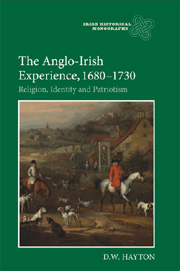Book contents
- Frontmatter
- Contents
- List of Illustrations
- Acknowledgments
- Abbreviations
- Preface
- Note on dates and quotations
- 1 From barbarian to burlesque: the changing stereotype of the Irish
- 2 Anglo-Irish attitudes: shifting perceptions of national identity
- 3 Aristocratic decline: the fall of the house of Ormond
- 4 A presence in the country: the Brodricks and their ‘interest’
- 5 ‘Commonwealthman’, unionist and king's servant: Henry Maxwell and the Whig imperative
- 6 ‘Paltry underlings of state’? The character and aspirations of the ‘Castle’ party, 1715–32
- 7 Creating industrious Protestants: charity schools and the enterprise of religious and social reformation
- 8 A question of upbringing: Thomas Prior, Sir John Rawdon, 3rd Bt, and the mentality and ideology of ‘improvement’
- Bibliography of secondary works
- Index
6 - ‘Paltry underlings of state’? The character and aspirations of the ‘Castle’ party, 1715–32
Published online by Cambridge University Press: 05 February 2013
- Frontmatter
- Contents
- List of Illustrations
- Acknowledgments
- Abbreviations
- Preface
- Note on dates and quotations
- 1 From barbarian to burlesque: the changing stereotype of the Irish
- 2 Anglo-Irish attitudes: shifting perceptions of national identity
- 3 Aristocratic decline: the fall of the house of Ormond
- 4 A presence in the country: the Brodricks and their ‘interest’
- 5 ‘Commonwealthman’, unionist and king's servant: Henry Maxwell and the Whig imperative
- 6 ‘Paltry underlings of state’? The character and aspirations of the ‘Castle’ party, 1715–32
- 7 Creating industrious Protestants: charity schools and the enterprise of religious and social reformation
- 8 A question of upbringing: Thomas Prior, Sir John Rawdon, 3rd Bt, and the mentality and ideology of ‘improvement’
- Bibliography of secondary works
- Index
Summary
In his writings, both public and private, Jonathan Swift voiced a low opinion of politicians. ‘I have conversed in some freedom with more ministers of state of all parties than usually happens to men of my level,’ he boasted to Alexander Pope in 1721,
And I confess, in their capacity as ministers, I look upon them as a race of people whose acquaintance no man would court, otherwise than upon the score of vanity or ambition. The first quickly wears off (and is the vice of low minds, for a man of spirit is too proud to be vain) and the other was not my case. Besides, having never received more than one small favour, I was under no necessity of being a slave to men in power, but chose my friends for their personal merit, without examining how far their notions agreed with the politics then in vogue.
Certainly he had little regard for those in power in Ireland during the long years of his Dublin exile. When they do figure in his satire, they appear as selfish and corrupt, ‘paltry underlings of state’; at best feeble and ineffective defenders of their country's interests, and at worst willing collaborators in its reduction to a state of slavery. Needless to say, this is not how Irish politicians saw themselves, nor how they were represented by their admirers. Clergymen preaching panegyrics, friends or family members preparing inscriptions to adorn commemorative monuments, authors offering tribute (often in the form of flattering dedications); all took a very different view, emphasising disinterested public service and genuine patriotism.
- Type
- Chapter
- Information
- The Anglo-Irish Experience, 1680-1730Religion, Identity and Patriotism, pp. 124 - 148Publisher: Boydell & BrewerPrint publication year: 2012



